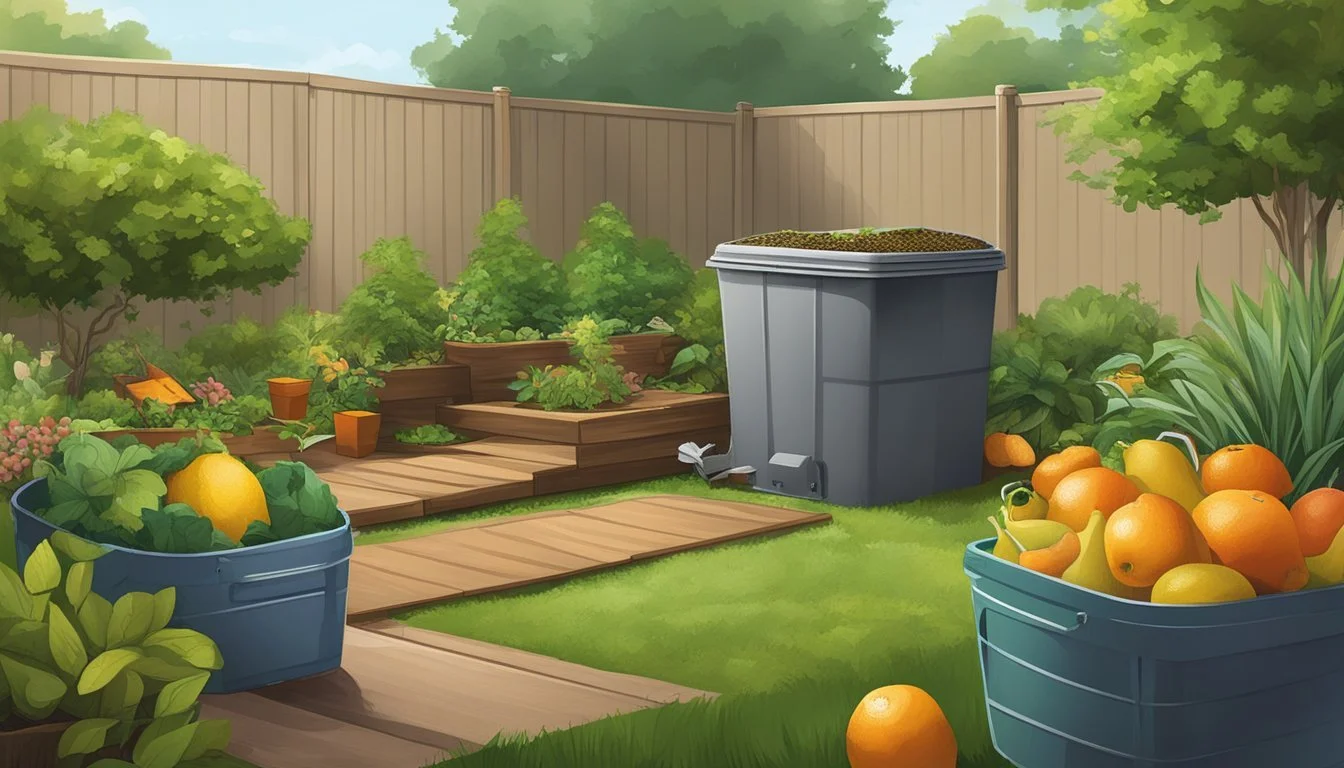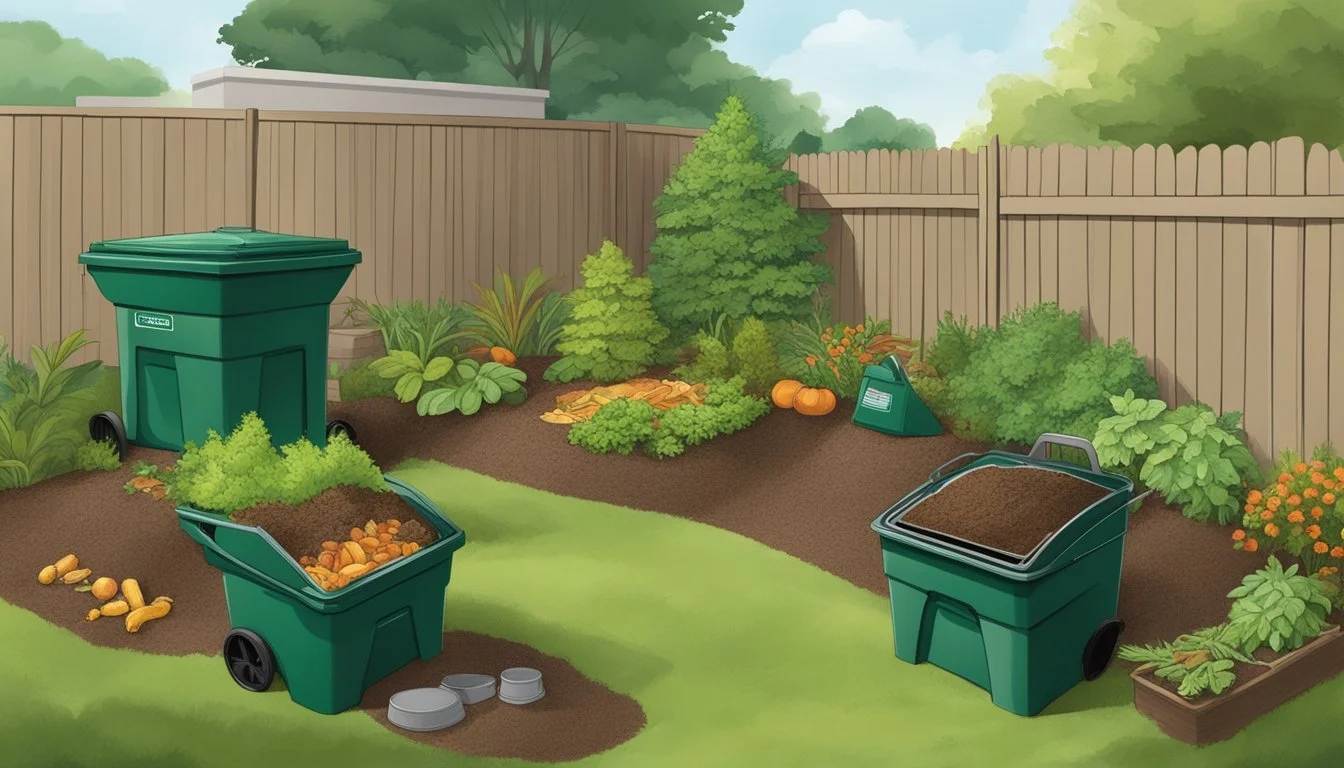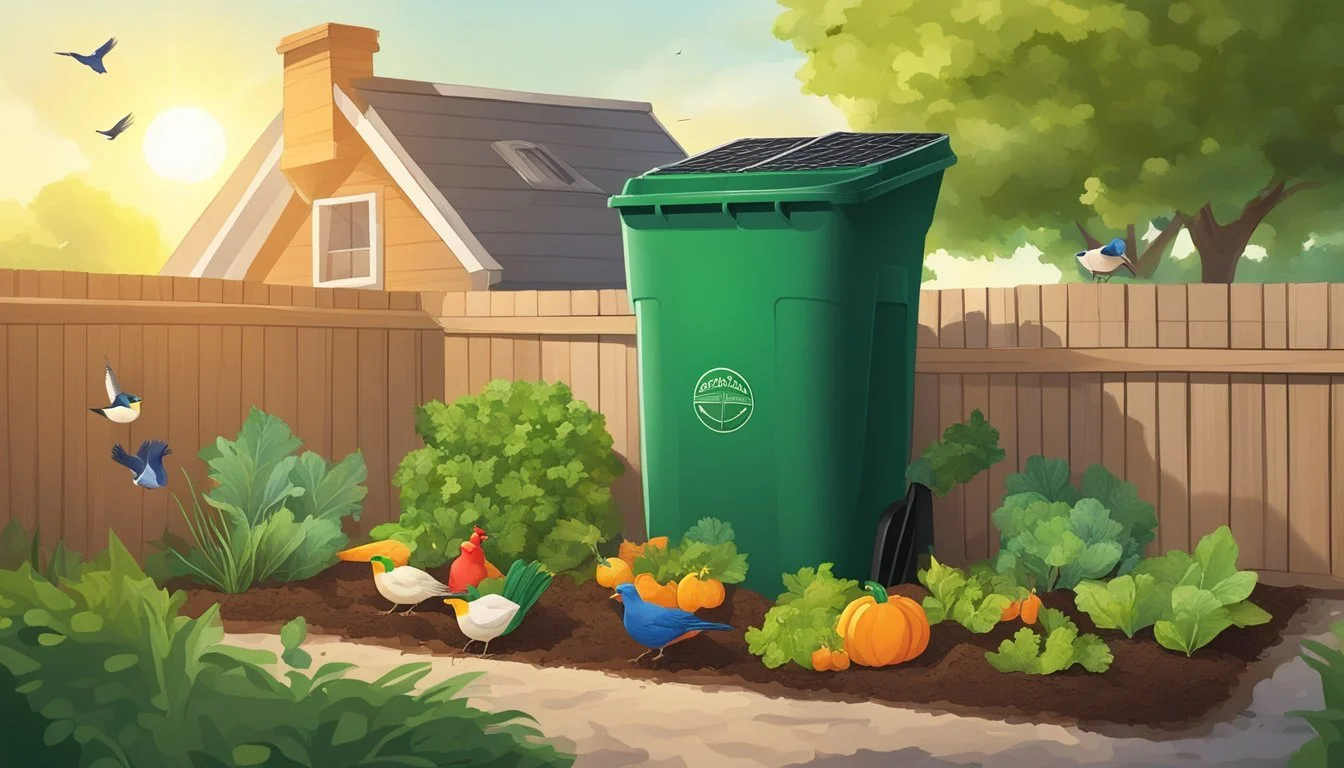Guide to Composting in Pearland, TX
Essential Steps for Residents
Composting offers an effective solution for reducing organic waste while simultaneously enriching the earth. In Pearland, TX, residents have the opportunity to convert their kitchen scraps and yard debris into valuable compost that can nurture gardens and landscapes. Recognizing the environmental benefits, initiatives in Pearland encourage community members to engage in composting practices, thereby promoting a greener, more sustainable city.
Educational resources and local composting programs serve as a testament to Pearland's commitment to the environment. Organizations such as Keep Pearland Beautiful provide residents with the knowledge and tools needed to start their composting journey. By diverting organic waste from landfills, composting in Pearland not only enriches the soil but also contributes to a reduction in greenhouse gas emissions, making it an integral part of the city's approach to environmental stewardship.
Further support comes from composting events and drop-off programs that make it easier for Pearland citizens to contribute to the cycle of organic waste reuse. From food scrap drop-off locations to free educational lectures on effective composting methods, the city offers ample resources for both seasoned composters and beginners. This collective effort showcases Pearland's proactive stance in fostering an environment where composting is a valued asset for the health of the planet and the well-being of its communities.
Benefits of Composting
Composting is a robust process that transforms organic waste into a nutrient-rich soil amendment, bolstering soil quality and diminishing the need for synthetic fertilizers. It plays a critical role in waste reduction by diverting materials from landfills, hence reducing emissions of methane.
Environmental Impact
Composting significantly lowers the amount of organic material ending up in landfills. Such diversion leads to a notable decrease in methane production, a potent greenhouse gas. By composting, residents in Pearland ensure a positive contribution toward a healthier environment. Efficient recycling of yard waste within the community abates the strain on landfill sites and minimizes the carbon footprint of waste management.
Soil Quality and Plant Growth
The use of compost improves soil structure, increasing its ability to retain water and nutrients. In Pearland, gardeners and farmers can utilize this organic material to enhance the fertility of their soil, leading to robust plant growth and resilience against diseases. Plants thrive in compost-amended soils, which supply a steady stream of essential nutrients, promoting vigorous gardens and landscapes.
Reducing Waste in Pearland
Pearland residents can significantly cut down on their household waste by starting a composting routine. Recycle kitchen scraps, lawn clippings, and leaves, turning what would have been trash into a valuable product. This not only lessens the volume of waste heading to the landfill but also turns it into a beneficial resource for soil enrichment, closing the loop on organic waste recycle.
Getting Started with Composting
Composting offers Pearland, TX residents a sustainable way to recycle organic waste into nutrient-rich soil. This section will guide beginners through the essential steps of starting a compost pile, focusing on compost composition, bin selection, and locating the ideal spot for composting.
Understanding Compost Composition
Composing a healthy compost pile requires a balance of carbon (browns) and nitrogen (greens). The general ratio for a thriving compost is roughly 3:1, with three parts brown materials like dry leaves, twigs, and cardboard to one part green materials such as food scraps, grass clippings, and coffee grounds. Adequate air circulation and maintaining the right temperature are crucial for the microbial activity necessary for decomposition.
Selecting a Compost Bin
Compost bins come in various styles and sizes, suitable for different needs. One can choose from a stationary bin, ideal for a fixed composting site, or a tumbling bin, which allows for easier aeration by turning. When selecting a bin, consider the volume of organic waste typically produced and the space available. A tight-fitting lid can deter pests and help regulate moisture levels.
Finding the Right Location
The location of a compost bin should facilitate the balance of moisture and temperature needed for effective composting. It should be placed in a well-drained area, receiving partial sunlight to help retain warmth without overheating. Proximity to the garden or kitchen can make adding to the compost more convenient, but sufficient distance from living areas is recommended to avoid any potential odor nuisance.
Composting Methods and Techniques
In Pearland, TX, composting can be an effective way to recycle organic waste into rich soil amendments. The key to successful composting lies in managing moisture, oxygen, and nutrients to promote efficient decomposition.
Backyard Composting
Backyard composting is a popular method that involves combining green and brown organic materials in a compost bin or pile. Greens are nitrogen-rich materials like vegetable scraps and coffee grounds, while browns are carbon-rich materials like dried leaves and cardboard. The ideal ratio is about 1:3 of greens to browns to balance nitrogen and carbon for rapid decomposition. Regularly turning the compost pile integrates oxygen, which is crucial for the composting process.
Vermicomposting
Vermicomposting utilizes specific types of earthworms to break down organic material. Red wigglers are commonly used and thrive in a container with moist bedding, such as shredded newspaper. Feedings should be of fruit and vegetable scraps avoiding meat, dairy, and oils. This method is effective for indoor composting and produces nutrient-rich worm castings, ideal for enhancing soil structure and fertility.
Trench Composting
Trench composting, also known as direct composting, involves burying organic waste directly in the garden. This low-maintenance technique slowly decomposes materials in the soil, eliminating the need for turning. To employ this method, one digs a trench about 12 inches deep, adds organic waste, and then covers it with soil. Remember that balance in moisture and air flow still matters, so it's crucial to avoid compacting the covered trench. This method efficiently recycles nutrients back into the garden.
What to Compost
In Pearland, TX, starting a successful compost requires an understanding of the right materials to include. It's essential to balance 'greens', which provide nitrogen, and 'browns', which supply carbon, while avoiding materials that can cause harm or attract pests.
Acceptable Greens
Greens are the nitrogen-rich materials in your compost. They help to heat up the compost pile and speed up the decomposition process.
Food waste: Includes fruits and vegetable scraps, which are excellent for compost.
Coffee grounds: They add nitrogen and are as beneficial as manure.
Grass clippings: Fresh clippings are a great source of nitrogen but should be mixed well to prevent matting.
Essential Browns
Browns give the necessary carbon to your compost, help maintain aeration and structure, and facilitate the composting organisms' habitat.
Newspaper: Shredded newspaper acts as a brown and should be added in moderation.
Cardboard: Clean pieces, broken down into small pieces, can be composted.
Leaves: Dry leaves are an excellent source of carbon and should be included in the pile.
Materials to Avoid
There are certain materials that one should not compost due to potential health risks, environmental concerns, or issues with pests.
Meat: Can attract pests and cause odor problems.
Dairy products: Similar to meat, can attract pests and produce odors.
Bones: Do not break down well and can attract pests.
Animal products: Carry the risk of disease and can attract pests.
Plastic: Not biodegradable and has no place in compost.
By carefully selecting the correct items for composting, Pearland residents can turn their organic waste into a valuable resource for their gardens while keeping their compost healthy and functional.
Maintaining Your Compost
Proper maintenance is crucial for a successful composting process, as it involves regulating moisture, oxygen levels, and the temperature within the compost pile. These factors influence the decomposition rate and help in producing a high-quality finished compost without unwanted odors.
Managing Moisture and Aeration
Moisture is essential for composting, but balance is key. A compost pile should feel like a wrung-out sponge; not too dry and not too wet. To check moisture levels, one can simply squeeze a handful of compost. If a few drops of water come out, it has an ideal moisture level. If it's too dry, adding water evenly will increase moisture. Conversely, if the pile is too wet, adding dry materials such as leaves or straw can absorb excess moisture. Aeration is equally important as it supplies oxygen required by microorganisms to break down organic material. This can be achieved by turning the compost pile every week or two, ensuring oxygen reaches all parts of the pile.
Controlling Temperature and Odor
A compost pile's temperature reflects microbial activity; it should be warm to the touch. The pile needs to maintain a temperature between 135-160°F to encourage decomposition while killing pathogens and weed seeds. A thermometer can help monitor these temperatures. If the pile is too cool, turning it to introduce more oxygen or adding nitrogen-rich materials like grass clippings can help increase the heat. To control odors, it's critical to balance "green" nitrogen-rich materials with "brown" carbon-rich ones, avoid overwatering, and ensure proper aeration. A well-maintained compost pile should have an earthy smell.
Identifying Ready Compost
One can recognize finished compost when the material is dark, crumbly, and mostly homogenous, with its original ingredients no longer discernible. It should also have a pleasant, earthy aroma indicating that there's no longer any odor of decomposition. Generally, it takes anywhere from a few months to over a year for compost to reach this stage, depending on the care taken during the composting process. To test if the compost is mature, one can place a sample in a sealed bag for a few days; if no odor develops, it's ready to use.
Community and Educational Resources
Pearland, TX is proactive in nurturing a sustainable environment through educational programs and community involvement. The city offers various resources aimed at promoting responsible waste management and fostering a culture of recycling and composting.
Keep Pearland Beautiful Initiatives
Keep Pearland Beautiful plays a pivotal role in fostering community composting efforts. This organization, which evolved from Clean Pearland in 1982, has been instrumental in environmental education and community engagement. Their staff actively supports Pearland and Alvin ISDs, highlighting the importance of environmental responsibility from a young age. Keep Pearland Beautiful has an established history of making a significant impact, as evidenced by their management of the Stella Roberts Recycling Center, which processes over 900 tons of recycling yearly and serves multiple cities across four counties.
Local Composting Workshops
The community benefits from freely accessible local composting workshops that encourage proper composting techniques. For example, a dedicated horticulture agent provided a Facebook Live event on composting done right. These workshops are not only educational but also offer practical advice and support for community members interested in starting or improving their composting practices.
City of Pearland Support
The City of Pearland is firmly behind its citizens' recycling and composting efforts. It extends support by hosting and promoting events and programs that teach the basics of composting, like understanding compost pile dimensions for optimal processing. Resources are made readily available to residents, and the city staff often participates in or leads educational tours, demonstrating their commitment to environmental sustainability and community educational education. The Citizens' Environmental Coalition also provides an up-to-date resource guide about local environmental work, ensuring people have access to the latest information and can connect with others dedicated to preserving Pearland's natural beauty.
Advanced Composting Topics
In Pearland, TX, composting goes beyond mere waste reduction—it has evolved into a refined method to boost garden and landscape vitality significantly. By focusing on advanced composting topics such as compost teas and extracts, dealing with pests and pathogens, and using compost in landscaping, gardeners can enhance nutrient availability and strengthen plant health.
Compost Teas and Extracts
Compost teas and extracts are liquid solutions made from compost that can provide a wealth of nutrients to plants when applied as a foliar spray or soil drench. By steeping compost in water, beneficial microorganisms and nutrients are leached out, creating a potent solution that can act as both a fertilizer and disease suppressant. Regular use of these liquids can result in vigorous garden and tree growth, as they deliver nutrients in a readily available form.
Combatting Pests and Pathogens
While compost generally improves plant resilience, advanced composting involves techniques to specifically target pests and pathogens. The key lies in cultivating a diverse microbial ecosystem within the compost, with the proper balance of heat, moisture, and aeration during the composting process. Such an environment encourages beneficial organisms that can outcompete harmful pathogens. Additionally, the correct carbon to nitrogen ratio helps to deter pests naturally without the need for chemical interventions.
Using Compost in Landscaping
Compost can be a transformative element for landscaping, proving especially effective when integrated into soil to support a variety of plants and trees. It serves as a soil conditioner, improving structure and water retention. When added to flower beds and around trees, compost also aids in establishing more resilient root systems. Moreover, as a top dressing, compost contributes to a healthier and more vibrant landscape appearance without the need for synthetic fertilizers.
Beyond the Bin: Reducing Kitchen Waste
In Pearland, TX, families are turning their attention to reducing kitchen waste, transforming scraps into valuable compost, and integrating eco-friendly practices. This maximizes recycling efforts and minimizes the environmental footprint at home.
Minimizing Food Waste at Home
Reducing food waste is feasible through mindful shopping and meal planning. Residents should consider purchasing only what they need and are likely to use, thus reducing spoilage and excess kitchen scraps. Families can implement a first in, first out system, ensuring older food gets used before newer groceries. Freezing leftovers or overripe fruits is also an effective tactic to diminish waste.
Creative Uses for Compostable Materials
Compostable kitchen scraps can have several creative uses besides traditional composting. They can enrich garden soil and feed indoor plants, providing a boost of natural nutrients. Coffee grounds, for instance, can be utilized directly in the garden to deter pests or added to a compost pile to accelerate the decomposition process. Cutting down waste not only benefits individual households but contributes to a larger community effort in waste reduction.
Eco-Friendly Kitchen Practices
To promote sustainability, one can employ eco-friendly kitchen practices such as using reusable containers and opting for biodegradable cleaning products. Encouraging recycling and composting within the family unit should be a combined effort, starting with educating each member on the importance of these actions. Together, these practices contribute to a substantial decrease in kitchen waste, demonstrating Pearland's commitment to environmental stewardship.
Composting in Pearland: Next Steps
Composting initiatives in Pearland offer residents practical ways to contribute to sustainability by transforming organic waste into valuable fertilizer. These efforts play a crucial role in waste management and soil enrichment within the community.
Drop-Off Locations and Home Pickup
Pearland residents have access to local drop-off locations, including the Stella Roberts Recycling Center, which supports recycling and composting services for over 30 cities across four counties. Additionally, certain services provide home pickup of compostable materials, making it convenient for residents to partake in organic waste diversion from landfills.
Leveraging Compost for Community Gardens
The nutrient-rich compost produced from Pearland's composting efforts is an asset for local community gardens. Utilizing this natural fertilizer can enrich garden soils, promoting healthier plant growth and reducing the reliance on chemical fertilizers. Houston-area gardens can also benefit from Pearland's compost, further extending the environmental impact.
Promoting a Circular Economy
Composting plays a significant role in Pearland's vision of a circular economy where waste is minimized, and resources are reused. By transforming organic waste into compost, Pearland is actively working towards reducing the amount of waste sent to landfills and providing a sustainable source of fertilizer for the community.











